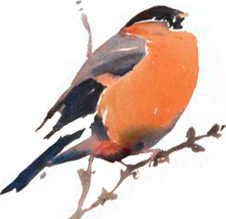Recording of rare bird species on the Isle of May
For species considered rare at a local level to appear in the Isle of May Report, they have to be assessed by the Isle of May Records Committee (IoMRC). Following a recent review the IoMRC adopted a more objective approach to determining those species assessed, and the Committee decided that the list should comprise all species with less than five records in the last 20 years. This is broadly in line with a number of other local records committees in Scotland and the UK.
A revised list of those species now requiring a description by IoMRC is shown below. It is the intention of the IoMRC that further updates to the list will take place at regular intervals to keep abreast of both changes in species' status as well as future taxonomic changes. The preferred method of description submission is via email to the Isle of May Recorder, Iain English. You can download a Rare Bird Record Form in Microsoft Word format (or browse a list of the details required) from the Bird Recording in Scotland page. Written details should be submitted for the following species/subspecies:
Isle of May Records Committee Rare Bird Description Species
Category A - Full description required
- Tundra Bean Goose
- Taiga Bean Goose
- White-fronted Goose
- Snow Goose
- Egyptian Goose
- Bewick's Swan
- White-billed Diver
- Leach's Petrel
- Great Shearwater
- Balearic Shearwater
- American Wigeon
- Green-winged Teal
- Ring-necked Duck
- Surf Scoter
- White Stork
- Great White Egret
- Red Kite
- Honey-buzzard
- Goshawk
- Hobby
- Rough-legged Buzzard
- Common Crane
- Black-necked Grebe
- Red Grouse
- Spotted Crake
- Dotterel
- American Golden Plover
- Little Ringed Plover
- Avocet
- Buff-breasted Sandpiper
- Pectoral Sandpiper
- Grey Phalarope
- Red-necked Phalarope
- Sabine's Gull
- Ring-billed Gull
- Long-tailed Skua
- Golden Oriole
- Hoopoe
- Firecrest
- Pallas's Leaf Warbler
- Icterine Warbler
- Barred Warbler
- Rose-coloured Starling
- Red-breasted Flycatcher
- Richard's Pipit
- Olive-backed Pipit
- Water Pipit
- Little Bunting
- Corn Bunting
- Kingfisher
- Tawny Owl
- Barn Owl
- Nightjar
- Magpie
- Turtle Dove
- Wryneck
- Great Spotted Woodpecker
- Great Grey Shrike
- Bearded Tit
- Coal Tit
- Blue Tit
- Great Tit
- House Sparrow
- Shore Lark
- Dipper
Category B - Brief description required only
- Garganey
- Pochard
- Smew
- Corncrake
- Little Egret
- Spoonbill
- Great Crested Grebe
- Slavonian Grebe
- Curlew Sandpiper
- Coot
- Little Tern
- White-tailed Eagle
Category C - Subspecies
Several rare or scarce bird subspecies are of interest and should be considered by the appropriate committees as required. Descriptions of subspecies on the list below (or others which may occur of similar scarcity) are welcome and should be submitted to the recorder in the first instance for forwarding to the correct assessment committee.
- Lesser Black-backed Gull L.f. intermedius & L.f. fuscus
- Jackdaw - other than C.m. spermologus
- Great Spotted Woodpecker D.m. major
- Chiffchaff - subspecies other than P.c. collybita
- 'Northern' Willow Warbler P.t. acredula
- 'White-spotted' Bluethroat L.s. cyanecula
- Reed Warbler of eastern form A.s. fuscus
- Common Redstart - other than P.p. pheoenicurus
- Black Redstart - subspecies other than P.o. ochruros
- Yellow Wagtail - subspecies other than M.f. flavissima
The Isle of May Bird Records Committee, comprising Chris McInerny, Mark Newell, Bex Outram, Ken Shaw and David Steel, will consider local rarities. The Scottish Birds Records Committee will consider Scottish rarities and the British Birds Rarities Committee will consider national rarities. Occasionally, the Recorder may request notes for species or subspecies not appearing on this list, when they occur outside their normal range or on unusual dates. All rarity descriptions should be sent direct to Iain English. Scottish rarities and British rarities should also be sent to Iain English, who will forward them to SBRC or BBRC.



